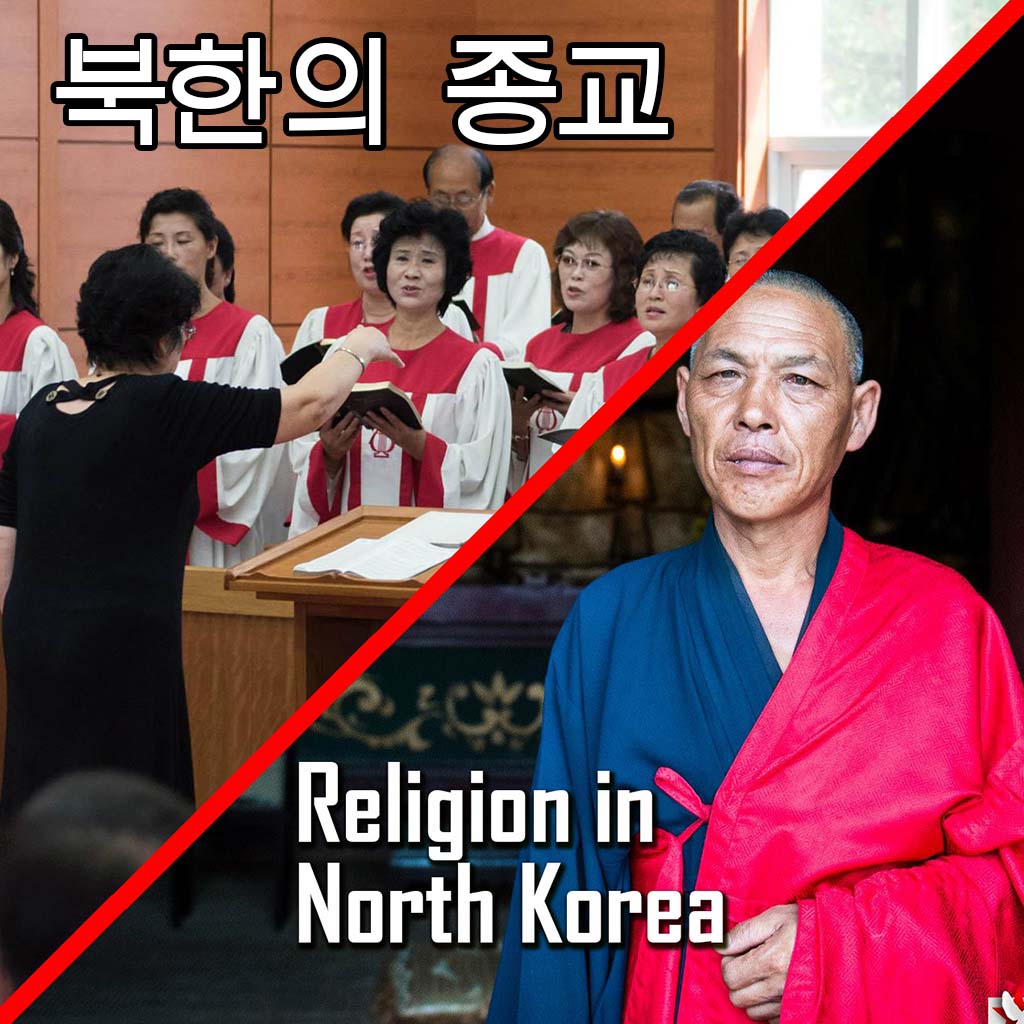Religion in North Korea 북한의 종교 – DPRK 360
INSIDE-NORTH-KOREA
RELIGION IN NORTH KOREA 북한의 종교

Religion in North Korea 북한의 종교
2020-01-29
BY DPRK 360
DISCLAIMER: The following article is based on my personal understanding. Much of the information I know came about through conversations with my North Korean friends. Lots of times we try to understand each other with both sides attempting to use analogies to explain concepts. It’s never easy as our worlds often feel so distant. I hope that sharing some of my interactions with them translates to a better understanding of their culture.
알림: 본 글은 저의 개인적인 이해를 바탕으로 씌여졌습니다. 제가 알고 이해하는 내용들의 대부분은 북한의 친구와의 대화를 통해서 습득된 것임을 알립니다. 많은 경우 저와 친구는 각자의 개념을 설명하기 위해 서로의 공통점을 들어 이해를 하고자 했지만, 대부분 각자의 세계가 서로 다르다는 것을 확인하곤 했습니다. 그들과의 대화를 나눔으로, 독자 여러분들이 북한의 문화를 이해하는데 도움이 되기를 바랍니다.
Based on the North Korean constitution, citizens are granted freedom of religious beliefs. I would think that with such a constitution in place, there would be a tangible manifestation of many religious activities, especially Asian ones like Buddhism or Taoism. In communist countries such as China and Vietnam, it’s easy to find symbols and statues pertaining to all manner of Asian gods and deities. However, in North Korea, the only place I can find such icons are within official religious buildings. When I ask my North Korean friends about the afterlife, most believe a person becomes a kind of spirit upon death, while others are unsure. For those who believe in becoming a spirit, the next question often eludes them. “Where do these spirits go?”
북한의 헌법에 의하면 모든 국민은 종교의 자유가 보장된다. 이런 헌법이 있다면 아마도 북한에는 여러 종류의 종교들이 실제로 존재하지 않을까? 특별히 아시아에서는 불교나 도교가 지배적이지 않은가?라고 생각했었다. 중국이나 베트남같은 공산주의 국가에서도 아시아 종교와 신성을 표현하는 상징이나 성상은 쉽게 발견된다. 그러나 북한에서는 오로지 공식적인 종교건축물에서만 그러한 종교적 성상을 볼수 있었다. 언젠가 북한 친구들에게 ‘인간이 죽은 후 어떻게 된다고 믿느냐?’고 물어보았다. 몇몇은 잘 모르겠다고 했지만 대부분의 친구들은 사람이 죽으면 영혼이 된다고 하였다. 그러나 그들조차 다음 질문에는 대답하지 못했다. “그 영혼이 어디로 가는거지?”
Are the “Eternal Leaders of Juche Korea” considered gods?
“주체조선의 영도자”는 신인가?
Based on what I understand through conversations with my North Korean friends, I would have to say no. They told me that they don’t pray to the Eternal President Kim Il Sung or the Great Leader Kim Jong Il the same way people pray to Jesus or to the Goddess of Mercy (观音). For example, if you’re worried about a critically ill family member, you might be inclined to pray to Jesus to heal that family member. Another example, if you bought the lottery, you might pray to the god of wealth ( 财神) to bless you with a win. North Koreans simply don’t pray to their leaders that way. They explained that they have a deeply entrenched respect for their leaders similar in ways to how a Chinese family would continue to show their respects to their deceased grandparents. I was told bowing and offering flowers to the leader’s statues and portraits are in a sense similar to how the Chinese give offerings to ancestors, only with much more extreme reverence and formality.
내가 북한의 친구들과의 대화를 통해 이해한 바로는 “아니”라고 말하고 싶다. 그들은 일반적으로 사람들이 예수나 관세음보살에게 기도하듯이 위대한 영도자이신 김일성 주석이나 혹은 김정일 위원장에게 기도하지 않는다. 예를 들면 우리는 가족중에 누군가가 중병에 걸리면 (기독교인인 경우) 예수님에게 의지하여 가족의 쾌유를 위해 기도하고는 한다. 또다른 예로, 복권을 살때 재물의 신에게 당첨을 기원하는 기도를 하기도 한다. 하지만 북한에서는 그런 식으로 자신의 지도자를 향하여 기도하지 않는다. 그들은 설명하기를 마치 중국인들이 자신들의 조상을 향하여 계속해서 예를 표하듯이 자신들의 지도자에게 깊은 존경을 표할 뿐이라고 한다. 지도자의 동상과 초상에 절하고 헌화하는 것은 단지 그 존경과 예식의 정도가 극단적일 뿐, 어느 면에서 중국인들이 조상들에게 하는 것과 흡사하다고 그들은 말한다.
Do North Koreans believe in anything spiritual?
북한의 사람들은 영적인 것을 믿을까?
From what I understand, they do have some superstitions. There’s “lucky money”; usually a US dollar with a rare marking or “lucky numbers” that include any combination of 88 or 888. I was surprised to learn that some North Koreans seem to have picked up this superstition from the Chinese. The number 8 in Chinese is Bā (八),which sounds like “get rich” (Fā 发). Chinese believe the more 8s a dollar note has, the luckier it is. Some North Koreans appear to have adopted this belief.
A few North Korean friends also believe in karma, although not exactly the Buddhist interpretation of it. They told me that people who do lots of bad things will receive bad things sooner or later and that people who do good things will also receive good things sooner or later.
Lastly, some of them seem to believe in ghosts. They told me it’s usually someone who died tragically or unhappy. When I asked them to tell me a North Korean ghost story. They just told me “not today… next time…” I never got to hear the ghost story.
내가 이해한 바로는, 그들에게도 어떤 미신이 있는 듯 했다. 그것은 “행운의 돈”인데 일반적으로 미국달러 지폐 안에 독특한 표식이 있는 경우 혹은 88이나 888의 숫자의 조합이 일련번호에 들어간 경우이다. 나는 이 중국에서 유래한 미신을 북한 사람들도 따르고 있다는 것에 적잖이 놀랐다. 이것은 원래 숫자 8을 뜻하는 중국어 八의 발음이 부자가 되다는 뜻의 发과 발음이 비슷함에 유래한 미신이다. 중국에서는 달러지폐의 일련번호에 8이 많을 수록 더 행운이 있다고 생각한다. 마찬가지로 북한에서도 그렇게 믿는 것으로 보인다.
소수의 북한 친구들은 인과응보를 믿는다. 비록 불교의 용어를 빌어 말아지 않지만서도 말이다. 그들은 말하기를 나쁜 행위를 많이 한 사람은 반드시 나쁘게 되고, 선한 일을 많이 한 사람은 반드시 좋은 것으로 보상을 받는다고 한다.
마지막으로, 몇몇의 북한 친구들은 귀신의 존재를 믿고 있었다. 일반적으로 비극적이거나 불행한 죽음을 겪은 사람이 귀신이 된다고 한다. 나는 혹시 북한의 귀신이야기를 들을 수 있을까하고, 귀신 이야기를 해달라고 했지만 그들은 “오늘은 아니야… 다음에 해줄께…”라고 했다. 귀신이야기는 들을 수 없었다.
Pohyonsa 보현사
Situated in Mount Myohyang, the Pohyon Buddhist Temple is a national treasure due to its significant history. It was founded in 1024 during the Koryo Dynasty and was later restored from the damages inflicted on it during the bombing runs of the Korean war. Several monks currently live in the temple compound to maintain the Buddhist relics stored in special climate-controlled rooms.
묘향산에 위치한 보현사는 천년의 역사를 자랑하는 국보급 문화재이다. 보현사는 고려시대인 1024년에 건축되었고, 한국전쟁 당시 폭격에 의하여 훼손되었다가 후에 다시 복원되었다. 현재는 몇몇의 스님들이 경내에 거주하며, 온도조절장치가 있는 특별방에 보관된 불교 유물들을 관리하고 있다.
 Click to open 360° image
Click to open 360° image360도 사진 감상을 위해 클릭하세요.
Bongsu Church 봉수교회
Being Christian myself, the North Koreans cordially invited me to attend a Presbyterian church service in Bongsu Church 봉수교회, Pyongyang. The entire service was conducted in Korean so I didn’t understand a word of what they were saying. However, I did enjoy their choir very much as they sang familiar hymns in Korean. One thing I noticed was that nobody wore their leaders’ pin within the church compound!
There’s often a lot of debate on the authenticity of churches in North Korea. Since it’s a situation where any comment (good or bad) would instantly draw flak from the opposing side, I’ve decided to skip my opinion on this part and just show you the 360° Virtual Tour:
내가 기독교인임을 알고 북한측에서는 나를 평양의 봉수교회(장로교회)의 예배에 초대를 해주었다. 모든 예배의 절차가 한국어로 진행되었기 때문에 한 마디도 이해할 수 없었다. 그러나 찬양대가 나에게도 익숙한 찬송가를 한국어로 부를 때에는 매우 기뻤다. 내가 한가지 발견한 것은, 교회 안에서는 아무도 ‘영도자’가 그려진 배지를 달고 있지 않았다!
북한의 있는 교회에 대해서 많은 진정성 논란이 있다. 매우 민감한 사항이면서 많은 논란을 불러올 주제이므로, 나의 개인적인 견해는 서술하지 않고 360도 버추얼 이미지로 대신한다.
360도 사진 감상을 위해 클릭하세요.
Changchung Cathedral 장충성당
During one of my visits, I managed to take a very quick look inside Changchung Cathedral on a Sunday morning. There are a couple of foreigners who are stationed in North Korea attending Catholic mass regularly. I only spent a quick 5 minutes up on the balcony to grab some photos and left.
북한 방문 중, 어느 일요일 아침에 장충성당을 잠시 들러볼수 있었다. 북한에 거주중인 외국인 한쌍이 성당 미사에 주기적으로 참여하고 있었다. 겨우 5분의 시간동안 발코니 위에서 몇장의 사진을 남겼다.
 Click to open 360° image
Click to open 360° image360도 사진 감상을 위해 클릭하세요.
No comments:
Post a Comment